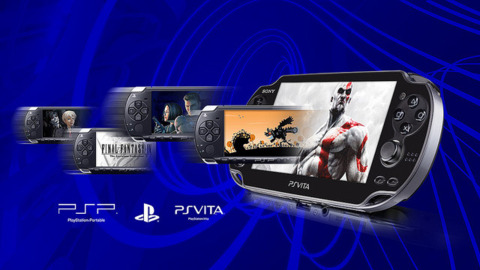Is PS Vita Discouraging Downloadable Games?
Sony's pricey proprietary memory cards could be considered a gouging of gamers, a retail partner pacifier, and a calculated business strategy all at once.
It has been a week since the PlayStation Vita officially launched, and I'm pretty smitten with the system. Hot Shots Golf is as pleasingly approachable and addictive as ever, Touch My Katamari breathes new life into a series that has been stale ever since its second installment, and Rayman Origins and Ultimate Marvel vs. Capcom 3 offer tantalizing reproductions of console titles I never really devoted sufficient time to the first time around. Also, twin analog sticks! Finally!
Despite that, there's one aspect of the system that leaves a bad taste in my mouth, and that's the proprietary memory cards. Rather than rely on inexpensive industry standard SD cards for data storage, Sony saddled the Vita with its very own memory cards that don't work with anything else and aren't made by anyone else. Sony told Joystiq the reason for the proprietary format was to fight piracy. Sony told GameSpot that the proprietary format lets it better control performance and quality to "make sure that the gamer has the best possible experience." What Sony isn't telling anyone, but what should be readily apparent to everyone, is that the proprietary format cuts out competition and lets Sony charge grossly inflated prices for PS Vita memory cards.
What Sony isn't telling anyone, but what should be readily apparent to everyone, is that the proprietary format cuts out competition and lets Sony charge grossly inflated prices for PS Vita memory cards.
What bothers me most about this isn't that Sony's proprietary pricing is essentially anti-consumer; it's that Sony is hurting its customers for little gain to its bottom line (possibly none at all). The memory card pricing may bolster Vita peripheral sales in the short term, but it will stifle software sales in the long run. By putting a premium on memory cards, Sony is forcing customers to overcome multiple intent-to-purchase hurdles every time they buy something. They have to consider whether or not the actual asking price of the content they want is worth it, and then they have to ask whether the amount of space it takes up is worth it. It's hard enough convincing someone to download Uncharted: Golden Abyss for $50, but when they realize that game will take up 3.2GB of a $20 4GB memory stick, that's bound to give a person pause. Maybe not a long enough pause to actually download a 3.2GB game, but long enough to reconsider making a purchase.
If Sony is lucky, those who think twice about downloading the game will still buy the retail version. That puts $50 in Sony's pocket, but with a slimmer margin than a download due to the cost of the physical goods, distribution, and the retailer's cut. And that's Sony's best-case situation for Uncharted, a system-selling game that people will jump through a few hoops to seek out. Consider what happens to sales of all the other games, music, and movies that Sony offers only through the PlayStation Network, when players are forced to consider their available memory card space as a resource just as finite as their money. Those transactions, all of which put money in Sony's pocket, might never happen at all.
Sony's proprietary memory card pricing discourages digital sales, which means gamers are more likely to buy retail versions, which means there will be more copies of the game that could show up used in GameStop, undermining new sales and driving prices down prematurely. Considering the lengths to which Sony has gone to try to undermine the used game market (an online pass for Patapon?!), this points to an embarrassingly muddled corporate strategy.
I suspect the real conflict here isn't between Sony and gamers; it's between Sony and its retail partners. The PS Vita is the biggest threat to the brick-and-mortar distribution system to date. Every single game released on the system will be available digitally on the same day as it appears in stores. In many cases, the digital version will sell at a discount (slight though it may be) from a physical copy. And this isn't a fire-and-forget experiment like the PSP Go. This is Sony's flagship portable for the next seven years or so, the bigger and better follow-up to the 75-million-selling PSP. No system before this enabled players to cut the retail tether so easily.
That said, Sony still needs the GameStops, Best Buys, and Wal-Marts of the world to carry its games, systems, and accessories, because digital distribution of games isn't accepted or easy enough just yet for the company to justify a complete switch-over. So how does Sony release a system designed to make its retail partners obsolete without alienating them while they're still useful? Pushing gamers to brick-and-mortar stores for expensive high-margin accessory sales is one way to do it, and there are no more expensive Vita accessories than the system's memory cards. It also helps that memory cards are mysteriously mandatory for a number of titles, that save data can't be stored on the retail games themselves like they can with 3DS games, and that even devoutly digital gamers who want nothing more than to avoid retailers will need to drop considerable money at those same stores for memory cards.

The somewhat counterintuitive strategy seems to be working immediately out of the gate, Electronic Entertainment Design and Research analyst Jesse Divnich told GameSpot.
"Certainly the reliance on memory cards is an olive branch to retailers, which receives more profit on accessory sales than any other category," Divnich said. "For a $100 memory card, Sony only receives $40 to $50, the rest is all retail margins…Fortunately for Sony, we are seeing memory card attach rates above 85 percent, so this shouldn't hinder digital sales for those that bought a Vita; however, it could hinder sales from consumers who have decided not to purchase a Vita due to the total cost of purchase."
Divnich speculated that Sony could get around the memory card issue by either including internal memory in a future configuration of the system, or tossing memory sticks into the hardware packages in lieu of a price cut. The current $250 version of the PS Vita doesn't come with a memory card, although for a limited time, the $300 3G-enabled version of the hardware will pack in an 8GB card.
The most frustrating thing about Sony's proprietary PS Vita memory cards is that they are more an intentional flaw than a simple oversight. Paying $100 for a memory card instead of a handful of games is bad enough, but Sony is sticking it to consumers to stay in good graces with retailers. And it's downright infuriating to see two places we players support with our money show their gratitude by joining forces to bend us over a barrel.
Got a news tip or want to contact us directly? Email news@gamespot.com

Join the conversation